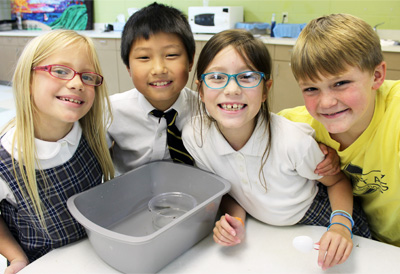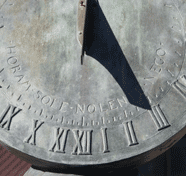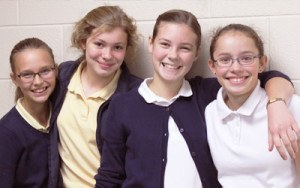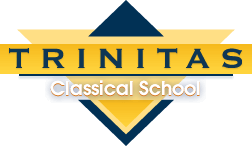Why Choose Trinitas?
We are sometimes asked, “When there are so many schools–public, charter, and private–in the area, why did you take on the enormous (but rewarding!) project of starting a school?” The short answer is that we could not find the education we wanted for our children. Trinitas offers that education. So, how do we differ from the other options out there?
 First, we are committed to being an ecumenical Christian school. This does not mean that we merely allow students of a variety of denominations to attend our school; it means, rather, that we are intentional about trying to create an education and a community in which Protestants, Catholics, and Orthodox alike feel at home. This intentionality can be seen in our choice of curriculum, our morning worship, our teacher training, and the friendships among Trinitas families. We have a desire to cultivate and celebrate all that unites us as Christians, while at the same time learning from our differences. Many of us have found a deepening of our faith in dialogue with Christians from other traditions, and we want our children to be educated in an environment where this dialogue occurs.
First, we are committed to being an ecumenical Christian school. This does not mean that we merely allow students of a variety of denominations to attend our school; it means, rather, that we are intentional about trying to create an education and a community in which Protestants, Catholics, and Orthodox alike feel at home. This intentionality can be seen in our choice of curriculum, our morning worship, our teacher training, and the friendships among Trinitas families. We have a desire to cultivate and celebrate all that unites us as Christians, while at the same time learning from our differences. Many of us have found a deepening of our faith in dialogue with Christians from other traditions, and we want our children to be educated in an environment where this dialogue occurs.
 Second, we are committed to classical education. Even if History, Latin and Logic typically make the list of subjects taught in a classical school, there are many versions of classical education. Most of them profess to be academically rigorous. Many of them treat classical education as an end in itself. Some of them, unfortunately, sacrifice the joy of learning in the process. At Trinitas, we believe that classical education is a means, not the end. A Christian classical education is an excellent means for preparing children for lives well-lived. The end is their flourishing. And, while we are academically rigorous, we don’t engage in rigor for its own sake. Furthermore, we are convinced that academic rigor and an engaging, joy-filled environment are not mutually exclusive. We believe, rather, that if we work very hard to attain both, we find that they support each other. This conviction has been at the forefront during our selection of both faculty and a curriculum.
Second, we are committed to classical education. Even if History, Latin and Logic typically make the list of subjects taught in a classical school, there are many versions of classical education. Most of them profess to be academically rigorous. Many of them treat classical education as an end in itself. Some of them, unfortunately, sacrifice the joy of learning in the process. At Trinitas, we believe that classical education is a means, not the end. A Christian classical education is an excellent means for preparing children for lives well-lived. The end is their flourishing. And, while we are academically rigorous, we don’t engage in rigor for its own sake. Furthermore, we are convinced that academic rigor and an engaging, joy-filled environment are not mutually exclusive. We believe, rather, that if we work very hard to attain both, we find that they support each other. This conviction has been at the forefront during our selection of both faculty and a curriculum.
Our headmaster and teachers exhibit a passion for Christian classical education and a love of children which is evident both in and out of the classroom. You’ll find their energy is contagious, and their concern for each child is clear. We carefully select and develop curricula that is both challenging and engaging for students, always working to make the Trinitas student’s education a well-thought out coherent whole from Kindergarten through eighth grade, and always striving to set objectives in a context of the appreciation of the beauty of God’s creation in history, language, and nature.
 Our history curriculum, for example, provides an introduction to world history in grades K through four; those same persons, places, and events are covered again in greater depth in grades five through eight. History at Trinitas is more than a set of facts to be memorized. Students engage history through a well-written narrative that naturally captures their interest. It’s been our experience that children are able to re-tell stories in astonishing detail (often with a gleam in their eyes). Older students, already familiar with the events, read select primary sources as they dig deeper. Through the creation of their own history cards, summaries, and time-lines, oral presentations, field trips, and hands-on activities, students gain what C.S. Lewis says we need perhaps most of all, an “intimate knowledge of the past.”
Our history curriculum, for example, provides an introduction to world history in grades K through four; those same persons, places, and events are covered again in greater depth in grades five through eight. History at Trinitas is more than a set of facts to be memorized. Students engage history through a well-written narrative that naturally captures their interest. It’s been our experience that children are able to re-tell stories in astonishing detail (often with a gleam in their eyes). Older students, already familiar with the events, read select primary sources as they dig deeper. Through the creation of their own history cards, summaries, and time-lines, oral presentations, field trips, and hands-on activities, students gain what C.S. Lewis says we need perhaps most of all, an “intimate knowledge of the past.”
The beauty of human language and God’s word motivate both the Language Arts program and Bible curriculum at Trinitas. From the excitement of the kindergartners as they begin to read on their own, to the delight of the fourth graders as they share their stories at Calvin Young Authors and their thoughts in Thoughtful Reader Book Club, to the pleasure of the seventh and eighth graders as they discuss really good stories by really good authors, we seek to give students the skills to appreciate excellent writing and to craft it themselves. We also seek to instill a love for the word of God, for the Word of God, in their hearts. Daily Morning Prayer, weekly Scripture memorization, intentional character education, volunteer opportunities, and a curriculum which teaches salvation history and inspires with stories of heroes of the faith are some of the ways by which we hope to cultivate this love.
 While classical schools are probably best known for their excellence in the humanities, they are sometimes weaker in math and science. Our appreciation for the beauty and order of nature as well as our current technologically driven culture/marketplace would demand considerable adjustment. We think that classical schools should exhibit excellence in these areas as well; and we believe we have found ways to do this while still approaching them “classically.”
While classical schools are probably best known for their excellence in the humanities, they are sometimes weaker in math and science. Our appreciation for the beauty and order of nature as well as our current technologically driven culture/marketplace would demand considerable adjustment. We think that classical schools should exhibit excellence in these areas as well; and we believe we have found ways to do this while still approaching them “classically.”
 We have chosen a math curriculum which has produced impressive results in international testing and was found in pilot studies not only to improve student performance in math but also student attitudes. In these studies, students’ test scores rose, and students were markedly more enthusiastic and confident in math. We have found this to be true at Trinitas as well. Our science curriculum is one of three recommended by the National Science Resources Center, the National Academy of Sciences, and the Smithsonian Institution as meeting their criteria for “an exemplary elementary science program.” It is an inquiry- based science program which means that students don’t just learn about science, they do it. They conduct experiments with magnets and electricity, design catapults, dissect chicken bones, and study cockroaches. Students at Trinitas learn a lot during science, and they love it. The program is also carefully designed to fit the development of the students as they progress through the grade levels so there are no gaps or unnecessary overlap. We think it maps nicely on to the stages of the Trivium.
We have chosen a math curriculum which has produced impressive results in international testing and was found in pilot studies not only to improve student performance in math but also student attitudes. In these studies, students’ test scores rose, and students were markedly more enthusiastic and confident in math. We have found this to be true at Trinitas as well. Our science curriculum is one of three recommended by the National Science Resources Center, the National Academy of Sciences, and the Smithsonian Institution as meeting their criteria for “an exemplary elementary science program.” It is an inquiry- based science program which means that students don’t just learn about science, they do it. They conduct experiments with magnets and electricity, design catapults, dissect chicken bones, and study cockroaches. Students at Trinitas learn a lot during science, and they love it. The program is also carefully designed to fit the development of the students as they progress through the grade levels so there are no gaps or unnecessary overlap. We think it maps nicely on to the stages of the Trivium.
 Trinitas students also study Latin, Greek, and Logic, subjects often reserved for high school or college. The reasons to study these subjects are many: easier acquisition of other languages and a deeper grasp of our own, appreciation of our history and culture, the ability to identify fallacies and to construct a persuasive argument, (even higher SAT scores); but perhaps the best reason is simply to train the brain. Just as physical education trains the body, Latin, Greek, and Logic develop the mind. While they may sound intimidating, we approach these subjects in a way that is fun. First and second graders begin Latin with songs and Minimus the mouse. Third through fifth graders learn through songs and chants with a curriculum integrated with our English grammar curriculum. Sixth through eighth graders use a high-school level text. Greek builds quite easily on students’ Latin foundation. Fifth and Sixth graders have fun with pre-logic exercises: puzzles, Venn diagrams, and fallacy detection, preparing them for their more formal study of logic in seventh grade and applied logic in eighth grade.
Trinitas students also study Latin, Greek, and Logic, subjects often reserved for high school or college. The reasons to study these subjects are many: easier acquisition of other languages and a deeper grasp of our own, appreciation of our history and culture, the ability to identify fallacies and to construct a persuasive argument, (even higher SAT scores); but perhaps the best reason is simply to train the brain. Just as physical education trains the body, Latin, Greek, and Logic develop the mind. While they may sound intimidating, we approach these subjects in a way that is fun. First and second graders begin Latin with songs and Minimus the mouse. Third through fifth graders learn through songs and chants with a curriculum integrated with our English grammar curriculum. Sixth through eighth graders use a high-school level text. Greek builds quite easily on students’ Latin foundation. Fifth and Sixth graders have fun with pre-logic exercises: puzzles, Venn diagrams, and fallacy detection, preparing them for their more formal study of logic in seventh grade and applied logic in eighth grade.
 Third, the Trinitas vision of Christian classical education also includes a strong commitment to community. A school is not a place where parents hand over the education of their children to the experts. We are a group of enthusiastic parents in the process of creating a school that will positively impact the education of our children and those who come after. We welcome interested parents to actively join with us in this endeavor and encourage their involvement in all areas of the school, in the classroom, in the lunchroom, on the playground, at extra-curricular events, and on committees. We are a lean organization, and you will find that a good idea may very quickly come to fruition. We are also pleased to host opportunities for parents and families to enjoy each other’s company outside of school throughout the year. While we are certainly not like-minded in all respects, we have found pleasure in the company of those who are like-minded in choosing a different education for their children.
Third, the Trinitas vision of Christian classical education also includes a strong commitment to community. A school is not a place where parents hand over the education of their children to the experts. We are a group of enthusiastic parents in the process of creating a school that will positively impact the education of our children and those who come after. We welcome interested parents to actively join with us in this endeavor and encourage their involvement in all areas of the school, in the classroom, in the lunchroom, on the playground, at extra-curricular events, and on committees. We are a lean organization, and you will find that a good idea may very quickly come to fruition. We are also pleased to host opportunities for parents and families to enjoy each other’s company outside of school throughout the year. While we are certainly not like-minded in all respects, we have found pleasure in the company of those who are like-minded in choosing a different education for their children.
What else makes Trinitas attractive? Our commitment to responsible stewardship, small class sizes, and block scheduling. We believe that a hallmark of a Christian classical school should be fiscal responsibility. We think it imperative that we not overextend ourselves financially (see question about high school below). We will continue to work toward a position in which our school will be self-sustaining (90% funded from tuition alone), so that donations can be used for improvements. We believe that 90% of funding should be in place before the school year begins. We are grateful to God that we have begun classes each of our years with at least 90% of the funding in place. We are committed to continuing to operate in this way.
 Small class sizes allow more individualized attention and build a sense of community among the students. Eighth graders know the Kindergarteners (they may even play with them at recess). Block scheduling allows each student to be placed at a level that meets his or her needs and provides appropriate challenges. Most subjects are taught at the same time throughout the school; so, for example, a student who excels in Math or Reading may take those classes at a higher level without being pulled out of History to do it.
Small class sizes allow more individualized attention and build a sense of community among the students. Eighth graders know the Kindergarteners (they may even play with them at recess). Block scheduling allows each student to be placed at a level that meets his or her needs and provides appropriate challenges. Most subjects are taught at the same time throughout the school; so, for example, a student who excels in Math or Reading may take those classes at a higher level without being pulled out of History to do it.
We have sometimes been asked, “What about high school?” While we would love to continue the Trivium through high school and will explore that possibility, it is very difficult to do high school well; the cost of a high school would be prohibitive at this time. We are committed to doing what we do well, and will only expand if we can do this with excellence. In the meantime, we will pursue the possibility of working with other area high schools and we believe our children are getting the best education available and will be well prepared for the future.
We invite you to come and see our vision of Christian classical education for yourself, either by visiting the classroom or coming to one of our Parent Information Nights advertised on our website www.trinitasclassical.org. You can call us at (616) 855-6518 or email info@trinitasclassical.org with any questions or to let us know you are coming. We’d love for you to join us, and we wish you well as you consider your options for your child.

